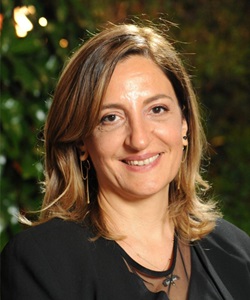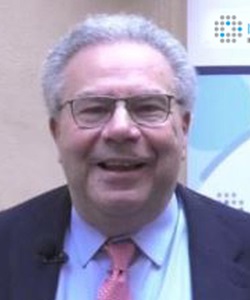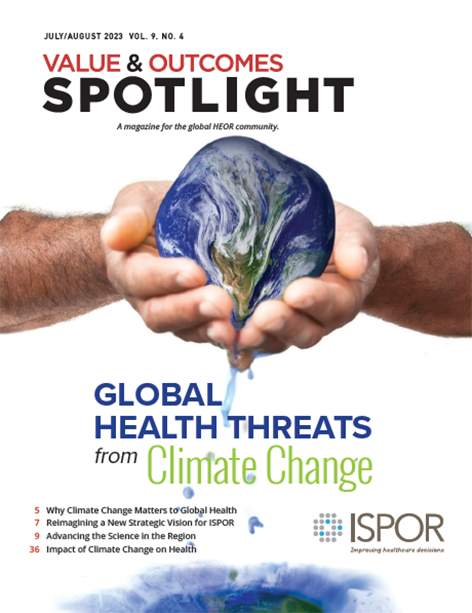Making an Impact and Advancing the Science in the Region: ISPOR’s 2023 Outstanding Chapter Award Winners
Small Chapter Awardee
 Daniela Paredes, RM, MPH
Daniela Paredes, RM, MPH
Instituto de Salud Pública ISPAB Universidad Andrés Bello, Health Economics and Reimbursement Manager,
Medtronic SouthLatam, ISPOR Chile Chapter President
Could you describe a particularly successful event or initiative organized by your Chapter and its impact on the HEOR community?
ISPOR Chile co-organized the 6th HEOR Workshop for payers to ensure an up-to-date and evidence-based discussion. The workshop also aimed to address the concerns of key opinion leaders and decision makers, such as national payers, superintendency, ministry of health leaders, and key public providers. The 2-day workshop discussed the implementation of Diagnosis-Related Groups (DRG) payment reform, barriers for undertaking risk-sharing agreements, and the urgent need to move toward a structured and formal health technology assessment (HTA). In this regard, ISPOR members have also actively participated in the national discussion to enact an HTA law.
The ISPOR Chapter also facilitated the DRG implementation in Chile by disseminating best practices, providing economic analysis derived from coding, and following-up add-on payment funds. As an example of this effort, ISPOR Chile co-organized a nationwide online seminar to revise the DRG’s implementation from a payment mechanism perspective in collaboration with an academic partner and medical devices industry, with a reach of 400+ attendees and more than 3000 visits from public providers.
As an ISPOR chapter outstanding awardee, what initiatives or projects do you plan to pursue in the future to further advance the HEOR science?
Aligned with our strategy to promote HEOR instruments at the providers’ level beyond academia, we must recognize local efforts using economic tools applied to day-to-day healthcare management.
As an innovation, we are planning the first National Best HEOR Practices Ranking. The Ranking will award diverse initiatives carried out by providers, industry, patients, and other stakeholders, in the areas of HTA, DRGs, and economic evaluations, among others.
How have you fostered inclusivity and diversity within your Chapter to ensure representation and equitable opportunities for all members?
The composition of our Board of Directors and Presidents is diverse and ensures the representation of the stakeholders in the healthcare system. Our members come from the pharmaceutical and medical devices industry, academia, and public and private providers. This composition also responds to a local strategy to foster the HEOR discipline beyond academia and to be able to export the benefits of HEOR to more stakeholders in the healthcare environment. In our vision, both public and private systems contribute to the healthcare sector and their interaction is a key component to our success.
Furthermore, the Chilean Chapter has promoted incorporating more female talent, with 4 members in the positions of President (Daniela Paredes), President-Elect (Paula Zamorano), Secretary (Carla Campaña), and Director (Magda Gutiérrez).
Medium Chapter Awardee
 Marie-Therese Estephan Sawaya, MD, Head of Public Affairs and Market Access – Levant and Iraq, ISPOR Lebanon Chapter President
Marie-Therese Estephan Sawaya, MD, Head of Public Affairs and Market Access – Levant and Iraq, ISPOR Lebanon Chapter President
As an ISPOR chapter outstanding awardee, what initiatives or projects do you plan to pursue in the future to further advance the HEOR science?
Lebanon is going through the most significant economic and financial crisis of its history. Our healthcare system and governmental bodies are in most need to accelerate and advance HEOR science to enable cost optimization while maintaining patients’ access to appropriate care management. Our chapter remains committed supporting authorities in advancing HEOR knowledge through education, collaboration, consultation, and partnership. Moreover, we wish to integrate the patient voice in the decision-making process by including patient advocacy groups in our chapter and providing them with an opportunity to be more visible, coordinated, and further exposed to the science of the HEOR assessment. Last but not least, we are committed to developing young generations of academia talents on the HEOR science through the creation of the student chapter and supporting the inclusivity and diversity of new members.
Could you describe a particularly successful event or initiative organized by your chapter and its impact on the HEOR community?
The local ISPOR chapter has been conducting annual educational meetings on different HEOR topics. Our 2022 event, “Moving Towards Sustainable Health System in Lebanon,” was inspired by the local emerging crisis and the need to provide decision makers with a framework and forum to exchange learnings from global or regional experiences. The meeting discussed the economic depression and funding landscape challenges to be a rare window of opportunity for the health system in Lebanon. We listened to the local experiences and the challenges faced by the Minister of Health and former General Directorate of the Ministry. Relevant learnings were shared from global and regional experiences. A concrete example on the transformation of the healthcare system in Turkey was exposed by the former Minister of Health in Turkey, Mr. Recep Akdag, with extremely insightful discussions and exchanges. A position paper was submitted later by the ISPOR board to the Minister of Health supporting the transformation strategy and implementation journey. Finally, the ISPOR local chapter was pleased to sponsor and support the thorough educational/research project of Dr Karam and her team to develop pharmacoeconomic evaluation guidelines in Lebanon.
How have you fostered inclusivity and diversity within your chapter to ensure representation and equitable opportunities for all members?
Inclusivity and diversity are cornerstones of our values. Member selection in the chapter ensures an equitable mix of private and public as well as academia, governmental, pharmaceutical, payers, and consultants. This was further emphasized during our general assembly elections in 2022, whereby by majority voting we opted to have the new board of ISPOR voted at 50% from academia and public payers versus 50% from the private and pharmaceutical industries, aiming to maintain a balance and equal opportunity to all point of views to be well-represented and addressed. This balance will be further enforced in the bylaws as we strongly believe that the sustainability of the local chapter will be based on an equitable balance among different healthcare partners and inclusivity of all, driven by a common goal and science to enhance patients’ outcomes and optimize the value offering across all sectors of the healthcare value chain.
Large Chapter Awardee
 Pier Luigi Canonico, MD, University of Piemonte Orientale, ISPOR Italy Rome Chapter President
Pier Luigi Canonico, MD, University of Piemonte Orientale, ISPOR Italy Rome Chapter President
As an ISPOR chapter outstanding awardee, what initiatives or projects do you plan to pursue in the future to further advance the HEOR science?
Our chapter is working hard on future initiatives and projects focused on HEOR science. First of all, we are working to reinforce the connection with young members by offering free membership for those under 35 years of age and involving them in new initiatives and programs together with senior HTA professionals for mentoring and coordination.
In addition, 5 projects are ongoing involving more than 60-chapter members (young and senior) representatives from government institutions, academia, consulting agencies and manufacturers. The projects investigate: (1) costing of resources in health economics in Italy, (2) use of real-world Evidence for pricing and reimbursement negotiations, (3) identification of standardized cost parameters for economic models from an Italian perspective, (4) use and future perspective of early access programs in Italy, and (5) working on the second edition of the EXPLORARE Project (Rare Disease Access Deep-dive).
During 2023, the ISPOR Italy Rome Chapter also planned the first training course (Bologna – Naples) to improve the practice of budget impact analysis and cost-effectiveness analysis.
Could you describe a particularly successful event or initiative organized by your chapter and its impact on the HEOR community?
Our Chapter supports 2 main events every year. The first one is the national conference that in 2022 was held in Rome (8th edition), involving more than 180 in-person participants from national and regional authorities, healthcare organizations, academic institutions, consulting agencies, and manufacturers of drugs and medical devices. It was held as a plenary meeting and hosted more than 5 sessions about the past and future projects promoted by the Chapter. The second main event is the Congress of ISPOR Rome for Future Group. The Chapter brought together all young ISPOR members under the age of 35, where the Congress served as a multidisciplinary network for new professionals in HEOR. The first event was held in 2022, involved more than 80 young members from national and regional authorities, healthcare organizations, academic institutions, consulting societies, universities, and pharmaceutical companies. The Congress was held as a plenary meeting, with an opening Lectio Magistralis followed by 3 sessions and was entirely organized by ISPOR young members. Both events will be repeated in 2023 and will facilitate networking among members and increase the Chapter’s visibility.
How have you fostered inclusivity and diversity within your chapter to ensure representation and equitable opportunities for all members?
As already discussed, one of the main aims of our chapter was to involve young people and maximize collaboration to ensure representation and equitable opportunities. Our members increased from 146 members in 2020 to 407 in 2023. Of these, 145 (36%) are under the age of 35 years and 54% are female. All the stakeholders are equally invited to participate in our projects and we encourage individuals from different backgrounds and identities to take on leadership roles and participate in the decision-making processes.

